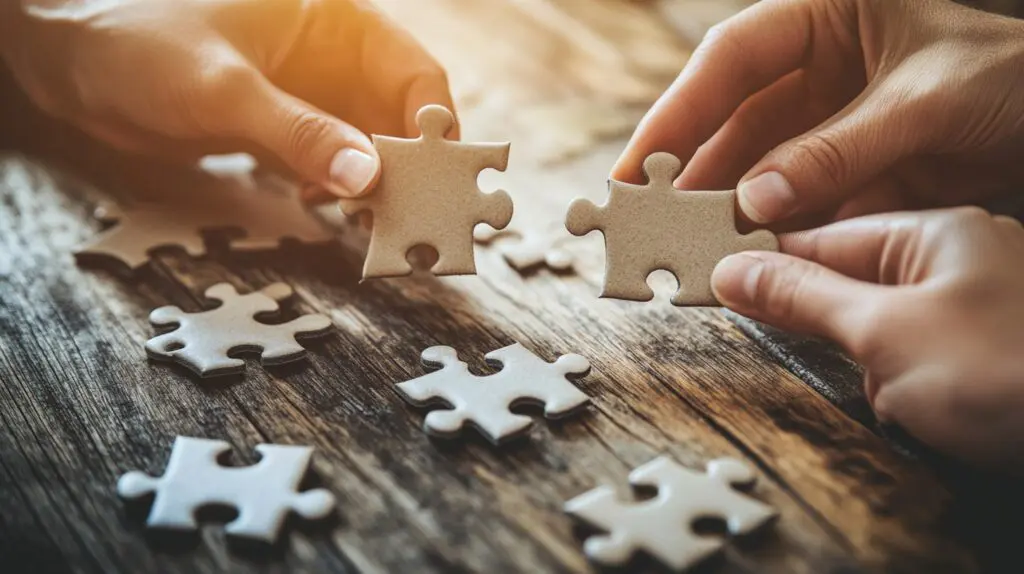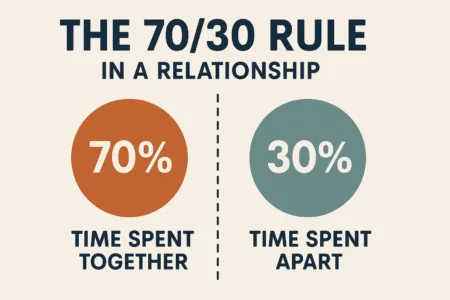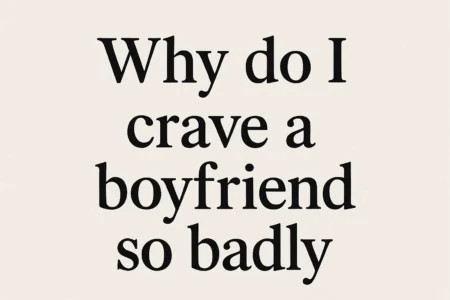Last summer, I found myself sitting across from my best friend at our favorite coffee shop, listening to her gush about the new guy she was dating. As she described their perfect dates and thoughtful text messages, I couldn’t help but think about my own rollercoaster experiences with someone who seemed perfect at first, but turned out to be completely wrong for me.
Building a relationship isn’t always as straightforward as rom-coms make it seem. Between my own experiences and the countless late-night conversations with friends about their relationship highs and lows, I’ve learned that there are certain truths about romantic connections that many women discover the hard way.
Whether you’re just entering the dating scene or reconsidering your approach after a breakup, understanding these realities can save you time, heartache, and frustration. Here’s what I’ve learned along the way—the good, the challenging, and everything in between.

1. The Communication Puzzle When Dating a Man
“He never tells me what he’s thinking!” I complained to my sister after three months of dating Ryan. His one-word responses to questions about his day left me constantly wondering where I stood.
When dating a man, you’ll quickly discover that communication styles often differ significantly. Research consistently shows that men tend to communicate more directly and with fewer words than women do. They’re often solution-oriented rather than emotion-focused in discussions.
This doesn’t mean all men are poor communicators—far from it. But understanding these differences can prevent misinterpreting his communication style as lack of interest or emotional depth. When in a relationship with someone who seems less verbally expressive, look for other ways he communicates—through actions, quality time, or problem-solving.
I eventually learned that Ryan expressed his feelings through actions rather than words. He might not text paragraphs about missing me, but he’d show up with soup when I was sick or remember tiny details from conversations we’d had weeks before. Dating a man sometimes means learning to read between the lines of what’s said—and what isn’t.

2. Emotional Vulnerability Takes Time
Six months into dating Josh, he finally opened up about his parents’ divorce and how it affected his view of relationships. That conversation changed everything about how I understood him.
One of the biggest misconceptions in these relationships is that emotional walls indicate he’s not interested or invested. In reality, many men have been socialized to equate vulnerability with weakness. In a relationship, patience with emotional intimacy often pays off.
Dating coach Maria explains: “Many women expect emotional openness on the third or fourth date, but that timeline is unrealistic for many men who’ve spent decades learning to protect their emotions.”
In a relationship with someone who seems emotionally reserved, creating safe spaces for vulnerability without pressure or judgment can make all the difference. This might mean asking open-ended questions without expecting immediate deep responses, or sharing your own vulnerabilities first to demonstrate trust.
I’ve found that dating a man often means respecting his emotional timeline, which may not match mine. The most meaningful connections I’ve formed came from allowing that vulnerability to unfold naturally rather than forcing it.

3. Independence vs. Togetherness When Dating a Man
“Don’t you want to spend Saturday with me?” I texted, feeling rejected when Tyler said he needed a day to catch up with his friends. It took me months to understand that his need for space had nothing to do with his feelings for me.
In these relationships, balancing independence and togetherness can become a delicate dance. Many women enter relationships expecting constant togetherness as proof of commitment, while many men value maintaining some independence within relationships.
Being with someone who values his autonomy doesn’t mean he’s not serious about you. In fact, relationship psychologist David suggests that “maintaining healthy independence within romantic relationships correlates with longer relationship satisfaction for both partners.”
The healthiest relationships I’ve observed when dating a man involve mutual respect for each other’s individual lives. This means supporting his friendships, hobbies, and occasional alone time—just as he should support yours.
My relationship with Tyler actually strengthened once I embraced this balance. Dating a man taught me that respecting each other’s independence created more meaningful togetherness when we did share time.

4. Understanding Timeline Expectations
Three months into dating Mike, my friends started asking when we’d make things “official.” I felt pressure to define the relationship, even though we were both still getting to know each other.
In romantic relationships, timeline expectations can become a major source of anxiety. Society often pressures women to secure commitment quickly, while men may approach relationship progression more gradually.
Your relationship doesn’t need to follow anyone else’s timeline. Relationship therapist Jennifer notes that “healthy relationships develop at their own pace, based on both partners’ comfort levels and life circumstances.”
I’ve learned that navigating relationships works best when both people communicate openly about their expectations without ultimatums. Understanding his perspective on relationship milestones—and sharing your own—creates alignment without pressure.
After my experience with Mike, I stopped watching the clock in relationships. Instead, I focused on whether we were progressing in a direction that felt good for both of us, regardless of how long it took to get there.

5. Financial Dynamics When Dating a Man
My first dinner date with Chris turned awkward when the check arrived. I offered to split it, he insisted on paying, and neither of us knew how to navigate the moment without making assumptions about the other.
Dating a man in today’s world means navigating evolving financial expectations. Traditional norms suggesting men should always pay are shifting, but inconsistently, creating confusion for both parties.
When dating a man, having an open conversation about financial expectations prevents discomfort. Some men feel most comfortable in a traditional provider role, while others prefer more egalitarian arrangements. Neither approach is inherently right or wrong.
Financial compatibility matters when dating a man, but not just in terms of income. Shared values about spending, saving, and financial goals often predict relationship success better than who pays for dinner.
I’ve found that the healthiest financial dynamics emerge when both people communicate openly about expectations and find arrangements that feel respectful and comfortable for both.

6. Physical Intimacy and Boundaries
“I’m just not ready yet,” I told Alex on our fifth date. His respectful response—without pressure or disappointment—told me everything I needed to know about his character.
When dating a man, navigating physical intimacy boundaries requires clear communication. Common stereotypes suggest all men want to rush physical intimacy, but in reality, comfort levels vary widely among individuals regardless of gender.
Dating a man with healthy attitudes toward intimacy means experiencing mutual respect for boundaries. Physical connection should develop at a pace that feels comfortable for both people, without pressure or manipulation.
Relationship educator Thomas emphasizes that “consent and comfort should guide physical progression when dating, not arbitrary timelines or external expectations.”
Through my relationship experiences, I’ve learned that the right person will respect your boundaries while being honest about their own needs. This mutual respect builds trust that strengthens all aspects of the relationship.

7. Meeting His Friends and Family
Eight weeks into dating James, his casual invitation to his sister’s birthday party left me analyzing what this “meant” about our relationship status.
When dating a man, meeting his inner circle often carries different significance than women might expect. While some women view introductions to friends and family as major relationship milestones, many men approach these introductions more casually.
Dating a man doesn’t mean every introduction carries symbolic weight. Sometimes meeting his college roommate is just that—not a secret relationship evaluation. Understanding his specific approach to integrating you into his life prevents misinterpretation.
Communication specialist Adrienne explains: “Men often compartmentalize relationships more than women do. Meeting family might be a natural social occurrence rather than a planned relationship step.”
I’ve learned to ask directly about the significance of these introductions rather than making assumptions. Sometimes what seems casual to him might be meaningful, and vice versa—another reason why open communication matters so much.

8. Understanding His Past When Dating a Man
When Ben mentioned his ex during our third date, my mind immediately went to worst-case scenarios about lingering feelings. In reality, he was simply explaining why he valued direct communication in relationships.
When dating a man, his past relationships provide context—not competition. How he speaks about former partners often reveals more about his emotional maturity than about any lingering attachments.
Dating a man with relationship history means recognizing that those experiences shaped him. A man who can discuss past relationships respectfully, acknowledging both good memories and learned lessons, often brings valuable perspective to new relationships.
Red flags when dating a man include excessive bitterness toward all exes, inability to take any responsibility for past relationship problems, or constant comparisons between you and former partners.
My experience dating a man taught me that healthy people don’t pretend their past didn’t happen. Instead, they integrate those experiences into personal growth that makes them better partners moving forward.

9. Different Conflict Resolution Styles
Our first argument left me frustrated because Sam went completely silent instead of discussing the issue. I later realized this was his way of preventing himself from saying something hurtful in the heat of the moment.
When dating a man, differing conflict styles often create misunderstanding. Research consistently shows that many men respond to relationship tension by temporarily withdrawing to process emotions, while women often prefer immediate discussion.
Dating a man successfully means learning each other’s conflict patterns and creating approaches that respect both styles. This might mean agreeing to brief cooling-off periods before discussing issues, or establishing ground rules for productive disagreements.
Couples counselor Michael suggests that “the goal isn’t adopting identical conflict styles when dating, but rather understanding each other’s approaches well enough to prevent misinterpretation.”
Through my experiences, I’ve learned that conflict resolution compatibility doesn’t mean always agreeing—it means finding ways to disagree that feel respectful and productive for both people.

Is Dating a Man Right for You?
Three years into my relationship with Eric, I realized how much my understanding of dating a man had evolved. The early anxieties about text response times and relationship labels had given way to deeper appreciation for our unique connection.
Dating a man successfully requires letting go of generalizations and getting to know the individual. While certain patterns may appear more commonly in men, individual variation matters more than gender-based assumptions.
When dating a man, assess compatibility based on shared values, mutual respect, and how the relationship makes you feel—not on relationship checklists or external timelines. The right connection won’t require constant analysis or anxiety.
Dating coach Rachel emphasizes that “the best relationships develop when both people focus on genuine connection rather than performing expected gender roles.”
My journey dating a man taught me that healthy relationships feel secure without constant reassurance, challenging without feeling impossible, and supportive without sacrificing independence.

Moving Forward in Your Relationship
Being in a relationship taught me that the most meaningful connections develop when both people bring authenticity, respect, and clear communication to the relationship. The arbitrary rules and timelines I once stressed about matter far less than how we treat each other daily.
If you’re currently in a relationship, remember that understanding general patterns can be helpful, but knowing the individual matters most. Ask questions, share your needs directly, and pay attention to actions rather than making assumptions.
Two years after that coffee shop conversation with my friend, we sat in the same spot discussing how differently things had turned out than either of us expected. Her “perfect” relationship had ended, while my slow-building connection had developed into something meaningful and lasting.
Dating a man isn’t about following a universal rulebook—it’s about discovering what works for the two unique individuals in the relationship. With patience, communication, and mutual respect, you can build something authentic that defies all the generalizations and stereotypes.
The most important lesson I’ve learned? When dating a man who’s right for you, the relationship doesn’t feel like constant work or analysis. Instead, it feels like building something meaningful with someone who sees and appreciates you for exactly who you are—with all the wonderful complexity that brings.
Frequently Asked Questions
What are key factors to consider before deciding if dating a man is right for you?
Assess compatibility based on shared values, mutual respect, and how the relationship makes you feel. Focus on genuine connection rather than external timelines or stereotypes.
How should I approach differing conflict styles when dating a man?
Understanding each other’s conflict resolution styles and establishing respectful methods to handle disagreements, like cooling-off periods or setting ground rules, can prevent misunderstandings and promote healthier communication.
Why is it important to respect independence in a relationship with a man?
Respecting independence allows both partners to maintain their individual hobbies and friendships, which can strengthen the relationship and create more meaningful togetherness when time is shared.
How long does emotional vulnerability typically take when dating a man?
Emotional vulnerability often takes time because many men have been socialized to see vulnerability as a sign of weakness. Patience and creating safe spaces for sharing can help build deep emotional intimacy gradually.
Why do men often communicate differently in relationships than women?
Men tend to communicate more directly and with fewer words, often focusing on solutions rather than emotions. Understanding these differences helps prevent misinterpretations and fosters better communication.





